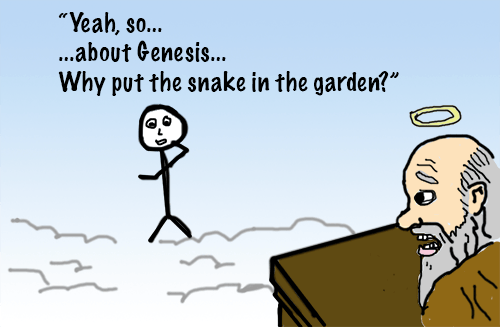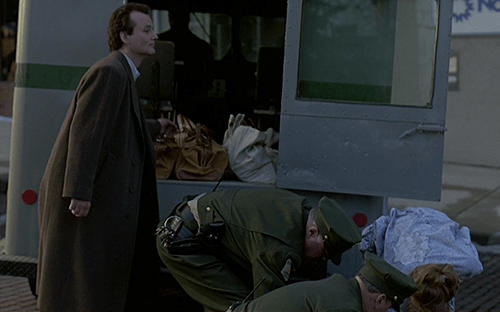Why I Like Surprises and You Should Too
I love surprises.
Imagine a man — oh, I’ll just pick a name at random, let’s call him James Randi. He’s a staunch materialist. And not the “I like to buy a lot of stuff” kind of materialist, but the sort that believes everything is made out of atoms and quarks (and whatever quarks are made out of) and that magic is physically impossible.
Now, imagine that this man, fed up with arguing with hippies and magical thinkers generally, snaps and declares, “I’ll bet anyone a million dollars that they can’t come into my laboratory and produce obviously supernatural phenomena.”
He declares this in a moment of exasperation, but he gets to thinking: y’know, this is a pretty good idea. A million dollars for the impossible. If someone is psychic, it’s free money for them. And if someone won’t take free money just to demonstrate their claimed power, well, they must be a fraud.
So he gets on the phone with the New York Times and he tells them about his brand new “One Million Dollar Paranormal Challenge”.
In the lab
Let’s fast forward a couple of months, to the point where money-seeking cranks have started slithering out of the Earth like worms in a storm. Imagine that this definitely fictional James Randi is in the lab with one of these worms. This worm, I’ll pick another name at random, let’s call her Theresa Caputo.
And this Theresa, who is fictional and definitely not a real life charlatan, claims that she can communicate with the dead. So James sighs, “Okay, Theresa. Tell me something that only a dead person could know. Something I know and they knew, but you have no way of knowing.”
Here’s where the universe diverges. In one branch, the usual happens. Theresa says something about James’s mother loving the water and boats, while James makes agreeable sounding noises — except he’s leading her on. His mom couldn’t swim and the water terrified her. (She had seen one too many “World’s Deadliest Sharks” specials on Animal Planet.)
But in the other branch, the surprising happens. Theresa details the family dog James had as a child. A fluffy, white contraption named Houdini, who loved milk so much that Randi’s mom would share her bowl of cereal with him after she had finished with it.
And on and on, like the time Randi had tried to grow his first beard and everyone called him Fuzz Aldrin. Or when he asked Sally Banks to prom and she turned him down and it crushed him, but actually she was just a lesbian and how could that be a reflection on him?
She’s saying this stuff, anecdote after anecdote that no one could know, and James grows more and more freaked out, the color of his face shifting from its typical rosy hue to a pale-moon grey, as if someone had opened up a picture of him in Photoshop and slowly moved the saturation from 100% to zero — until finally he bellows, “Okay, stop, enough! I get it.”
Theresa stops for a moment, a pause, silence, and then she chirps, “…but we haven’t even gotten to the mind reading bit yet.”
Contrasting consequences
Okay, now, consider how the lives of each James will unfold over the next couple of months. The James in the first branch will continue going about his life as he’s been doing it. Giving an interview here and there, maybe working on a book about skepticism (dubbed Citation Needed), and occasionally debunking so-called psychics in his lab. Business as usual, you know, the grind.
The other James has just had his belief system wrecked. Assuming that he’s not hallucinating and that this woman’s abilities hold up to further scrutiny, our best models of the universe are just wrong. The supernatural exists! Consciousness continues on after death.
This second James will be tasked with picking up the pieces of his belief system after this intellectual Earthquake, that has not only shook but toppled his belief systems and proved that the foundations were air all along. He’ll have to ask himself stuff like, “Is this proof of the existence of God? Should I be converting to some religious movement? Which one? If I’m wrong about this, what else am I wrong about?”
And that’s just James’s personal struggle. Consider the far reaching implications such a discovery would have. Proof of the supernatural! This would be a larger scientific discovery than anything before. More than Newton discovering classical mechanics, more than special relativity, even bigger than the ancient Greek’s discovery that, yes, the universe contains regularities that can be described by simple mathematical equations.
We’ll want to know: how does this woman communicate with the dead? Where are they? What’s the causal mechanism here? Is there some as-of-yet undiscovered physical phenomena taking place here? Or is a mysterious, inexplicable force somehow fundamental to the universe? Maybe it’s not so much that we don’t know, but that we can’t know.
Plus a billion more mundane questions: Can humans use their psychic powers to communicate faster than light? What about to communicate with the long dead to write history books? How about to make crops grow faster or to find oil? Can every human do this or just one? Can you train this ability? Is it located in a region of the brain? Can psychics predict the stock market?
And, of course, there would be a religious superstorm, a mad rush to claim that we called it, we knew it all along, that this woman was a product of our god. (Like terrorists taking responsibility for an attack, if you will.)
Information content
The value of information is usually defined as the amount someone would pay to know something prior to making a decision, but I like to this of it as the amount your behavior would change if you had the answer. That is, if you were clairvoyant — you know, like you could somehow plug your brain into the heavens and have always-on-access to a line of the best kind of credit: pure truth.
For instance, you might consider a firm doing medical research on new drugs. The economic incentive here is massive: the total revenue of Lipitor alone is something like $141 billion.
What’s the value of information here? Well, what if you knew before doing a bunch of expensive research and development that a certain chemical was going to be bust? The median cost of research and development per drug is something like 1 billion USD. Since 19 out of 20 medications in experimental development fail, the value of knowing ahead of time is going to be worth at least half a billion (and probably a lot more).
This can be converted to degrees, too. Reducing uncertainty from 38 to 27 percent might be worth something like 55+ million.
From this view, surprising information is more valuable than not surprising information: it leads to greater shifts in behavior. For the first James, he’s just found out that his model of the world was right, that psychics really are tricking people and whatever, and he gets to go on with his life as usual. Not too valuable. It maybe shifted his confidence from 99.99 percent to 99.990001 percent.
The second James has his world — well, at least his model of the world — torched. He found out that he’s been wrong about damn near everything. And what’s the value of this information? “What does it matter?,” you might ask. “Wouldn’t he be happier oblivious?”
Maybe not — consider the ramifications again. What if James had continued to live oblivious to the existence of the supernatural, remaining a staunch atheist, and the rapture comes along and, whoops, no heaven for James.
 Or, even more prosaically, consider the Earthly value of information here. James, as a result of his lab interview, might learn how to harness his own psychic powers, and maybe he has some prescient abilities. He can see the future and foresees a typhoon in India. After googling, he realizes that India is one of the world’s largest producers of coconuts, and this typhoon is going to coincide with the harvest. So he buys up coconut futures and sells them for a cool billion when the typhoon hits.
Or, even more prosaically, consider the Earthly value of information here. James, as a result of his lab interview, might learn how to harness his own psychic powers, and maybe he has some prescient abilities. He can see the future and foresees a typhoon in India. After googling, he realizes that India is one of the world’s largest producers of coconuts, and this typhoon is going to coincide with the harvest. So he buys up coconut futures and sells them for a cool billion when the typhoon hits.
Or, you know, he could totally use that information to save a bunch of lives.
Surprise as an indicator of incorrect models
As you’re probably noticing and, if not, the header should have given it away, surprise indicates that your model of the world is incorrect — that there’s something that you’ve failed to take into account.
I don’t know if you’ve seen the movie Groundhog Day but, basically, Bill Murray repeats the same day over and over again, and he’s the only one who’s aware that it’s happening. There’s a scene where he abuses his near omniscience to duck in behind an untended armored vehicle and steal a bag of money.
 He’s able to do this because he can anticipate everything that’s going to happen (he’s lived it before). His model of the world is perfect and, indeed, if you look at the original script, the author intended him to have spent like 10,000 years going through this same day. He was supposed to be godlike. There’s even a line in the movie where Murray says, “Well maybe the real God uses tricks, you know? Maybe he’s not omnipotent. He’s just been around so long he knows everything.”
He’s able to do this because he can anticipate everything that’s going to happen (he’s lived it before). His model of the world is perfect and, indeed, if you look at the original script, the author intended him to have spent like 10,000 years going through this same day. He was supposed to be godlike. There’s even a line in the movie where Murray says, “Well maybe the real God uses tricks, you know? Maybe he’s not omnipotent. He’s just been around so long he knows everything.”
This is to say that, when you have a perfect model of the world, you can anticipate everything that’s going to happen. Nothing should be surprising. When someone faceplants directly into their wedding cake, you saw it coming.
Surprise is all about the violation of expectations, and if an expectation has been violated, an implicit model has been violated. And that means that you’re wrong about something.
Every surprise indicates something you’ve failed to take into account. Like when I found out that cats are lactose intolerant and shouldn’t be given milk, I was surprised. I had failed to connect some pieces of knowledge in my head, namely, that most animals don’t drink milk past infancy, so why wouldn’t they be lactose intolerant? In this respect, humans are a bit of an anomaly (and it’s a relatively recent anomaly, too, at about 7500 years old.) ## Recovering from surprise
Which brings me to my next point, which is that, given surprise indicates something wrong with your model of the world, whenever you’re surprised, you should fix your model.
Ask yourself, “How could I have anticipated this?” and, usually, once you’ve answered that question, you’ve fixed everything.
As an example, I like Moravec’s paradox, which was the discovery that it’s much easier to teach a computer chess than it is to teach a computer to walk or recognize faces, while the reverse is true for humans. In a sense, what’s easy for computers is hard for humans, and vice versa.
Why should this be the case? Well, recall that the prefrontal cortex is a relatively new part of the brain. Evolution has not spent too many computational cycles optimizing our ability to reason, and virtually none on chess (modern chess is only about 550 years old.)
On the other hand, motor skills, sight, object recognition, facial recognition, that sort of stuff — that’s gone through a lot of iterations, something like 410 million years of iterations. So, yeah, that one is going to be a bit harder for humans to reverse engineer and implement on a general purpose computer.
Moravec’s paradox, then, can be anticipated by considering how long, on evolutionary timescales, a “feature” has existed. Duplicating human sight? Probably difficult. Mathematics? Easy, especially stuff like multiplication, division, whatever. (Trickier when you get to, say, proving the Riemann hypothesis.)
The sheer superiority of surprise over other forms of noticing wrongness
Okay, so we’ve covered:
- Surprises contain more information than the expected. * Surprises indicate incorrect models. * To fix incorrect models, ask how you could have anticipated a surprise.
Finally, let me point out the sheer superiority of surprise over the alternatives. Say you want to improve your model of the world, what are you going to do? Well, you could try to notice any tiny, nagging doubts you have about something, the sort that your mind quietly brushes over and you never even notice.
This is hard. I’ve spent more than a year meditating daily and I’m still not very good at it, and most of the time I don’t even notice those doubts until afterwards, when I’m like, “Huh, should have noticed that sound was his wooden foot and not rationalized it away as a funny brand of shoe.”
Surprise, on the other hand, demands your attention. You don’t even have to think about it. It turns out that your eyes and attached-frontal-brain-region-plus-amygdala automatically filter out nonsurprising information and direct your visual system towards surprising stuff in your environment. So you don’t even have to make an effort to notice something surprising. You just will.
 You could try to enjoy being wrong. Then you’ll naturally seek out opportunities for wrongness and wrongitude, chances to actively test your beliefs. There are people who say they can actually do this.
You could try to enjoy being wrong. Then you’ll naturally seek out opportunities for wrongness and wrongitude, chances to actively test your beliefs. There are people who say they can actually do this.
I suspect these people are just lying. I don’t like being wrong about anything. I have to make a conscious decision when someone disagrees with me to be like, “Wait, maybe they have a point and are objectively right, even though my monkey brain is too worried about status to admit to it.”
Surprise, on the other hand, is easy. Want to know some surprising information? Hell yeah, I want to know some surprising information. And, hopefully, you do, too, now that I’ve told you why I love surprises.
Further Reading
- If you enjoyed this, I’m working on a book about surprise. Subscribe here for updates. (And, if you don’t want updates, you can still subscribe for bonus drawings.)
- For surprises, check out the surprising facts for June post and, if you still want more after that, the rest are listed in the guided tour.
- I’ve also written before about the relationship between humor and surprise.

